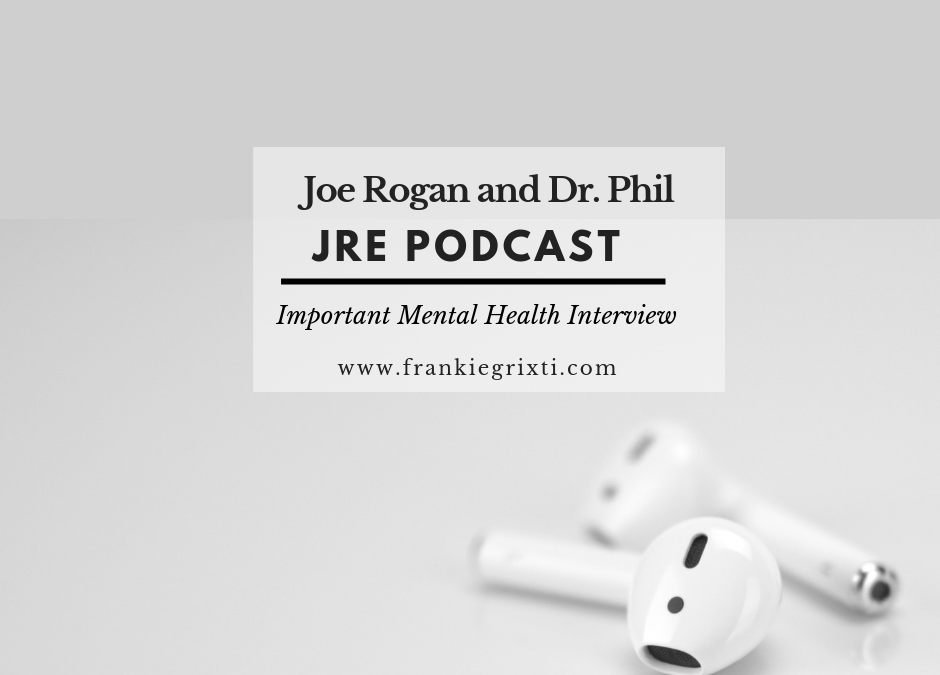Today I will be sharing my response to the Joe Rogan Experience podcast where he recently interviewed Dr. Phil on February 26, 2019 – I was blown away. This is episode #1254 of the JRE Podcast. If you haven’t had the chance to watch it yet, it can be viewed on Youtube or on any Podcast app for your smartphone.

Initial Instinct
Internal bias is something all therapists have to be actively aware of with their clients. It’s probably good for everyone to try to be aware of it in everyday situations anyway. I admit that going into watching the JRE / Dr. Phil podcast, I was struggling with a preconceived bias. Prior to even hearing that Dr. Phil would be on one of my favorite Podcast channels, I’ve had a little bit of criticism of Dr. Phil’s show. As with all day-time TV shows, The Dr. Phil Show seemed very commercialized and even scripted. After-all, his show is responsible for creating the infamous “Catch Me Outside” celebrity , Danielle Bregoli, who went viral by storm. Thus, I definitely anticipated “hate listening” to this episode of the Joe Rogan Experience.

I have to admit, I was pleasantly surprised – keep reading to see my authentic reaction and a breakdown of some of the more noteworthy moments of the podcast.
Memorable Discussion Points
The Joe Rogan podcast episodes never disappoint in this area. He has some very intriguing interviews about topics that are worth remembering – The Dr. Phil episode was no different.
To me personally, the most incredible moments occurred within the first 40 minutes of the podcast because this is where the most productive conversations in regards to mental health was conducted. I found myself extremely interested at several moments of the first half of this episode.

Here is a list of the top 6 discussion points of the episode:
1. “I don’t think problems are simple at all, but the solutions are often simple.” – 7′ 02″
Only 7 minutes into the podcast, Joe and Dr. Phil start a great discussion on problems people face and the effective behavioral treatments. Dr. Phil expands to say a person may have success if they attempt to “behave your way to success…At some point, you have to stop focusing on why and start focusing on what. Instead of why did it happen, what am I going to do to change it?” After all, theorizing and processing is only useful if it is followed by action. Dr. Phil goes on to speak about the “payoff” of unproductive or destructive behaviors to figure out why we do the negative things that we do. However, he is very specific to mention that the goal of theorizing and processing the “payoff” is to figure out how to “control the behavior.”
2. “Damaged personal truth.” – 13′ 16″
This is a topic that isn’t taught to children at a young age resulting in people growing up to hold onto a terribly destructive mentality that dictates their own self-value. A monumental part of therapy is positive regard towards your client: helping them to recognize their own self worth. As Dr. Phil goes on to explain to Joe, we feel “second class” based on the negative life experiences we have, yet we compare ourselves to “everybody else’s social mask.” This is especially true in the world of social media where we all try to present as our best selves.
If we constantly compare ourselves to other people’s public presentation of themselves, we will always feel that we are trailing others. This happens because we know about the negative aspects of our own lives but only see the most polished versions of other people’s lives. This results in thoughts of lowered self-worth and acceptance of lower standards for ourselves. This is a conversation to have with your clients, your children, your family, and your friends because we all deserve to see ourselves as the best we can authentically be.
3. “Incremental changes over the long haul.” – 15′ 34
Joe Rogan says this one so perfectly that it shouldn’t be summarized: “If these two boats are going in a parallel direction and one of them just shifts 5 degrees, over the course of time this boat is going to be in a far different place than the other boat that’s going the same way it was always going.”
Dr. Phil responds so perfectly that it shouldn’t be summarized either: “The next year is going to go by whether you’re doing something about your life or not…They may think, ‘I’m so far away, I’ll never get it under control’ or ‘I’m so far behind on my bills,’ or ‘I’m so depressed and everything is so out of control.’ Well you make those incremental changes and then pretty soon…you go ‘hey, I’m way better off than I was in February,’ and if you don’t you’re just in deeper so every little bit matters.”
No need to expand – keep that in mind as your year keeps going
4. “There’s a stigma attached to mental illness.” 18′ 10″
I was PERSONALLY very happy to hear Dr. Phil and Joe discuss this topic seeing how I just recently wrote about the mental health stigma. Dr. Phil encourages us to speak about our mental illness and mental health the same way we speak about other health concerns and that it should be accepted so that we can support each other to get help and get past whatever challenges we’re facing. That’s the whole point of this website! Let’s help each other to help ourselves!
5. “I’m very slow to medication. I think you use medication for biochemical replacement.” – 19′ 18″
From the 19 minute mark of the podcast to about the 38 minute mark, there was an in depth discussion about prescription medication between Joe and Dr. Phil. This field is evolving, no doubt about it. Conversation about medication abuse, the financial bias of prescribing medication, addiction in general, and solving symptoms of a mental health diagnosis through the use of only talk therapy is becoming more and more common.
Dr. Phil explains in the case of depression that often people are reacting to the reality of a terrible situation and that “pain is a motivator.” He goes on to tell a story about how the physical pain of standing barefoot on hot asphalt will motivate you to run to the cool grass. He explains that the pain of depression is no different in its ability to motivate us. People will have a natural drive to fix the situations that are causing them emotional distress.
It is worth noting that he is NOT against the use of medication. Even in the case of depression, he goes on to explain that psychiatric medication can be used to essentially springboard someone into improving their lives. Dr. Phil explains that this is especially useful for someone with depression who has what is referred to as “psychomotor retardation, the lessening in activity level…you think slower, less actively. You behave less actively. Your chance of getting rewarded goes down.” Someone affected in this way can start a temporary medication treatment. This will help a person to get an initial mood boost that supports him or her to work on certain aspects of life which in turn allows the person to boost their own mood without medication. At this point the medication can be taken away. He also explains that meds that treats psychotic diagnoses such as Schizophrenia will allow a person to function in a talk therapy environment where they otherwise would not.
Finally, Joe and Dr. Phil discuss the opioid epidemic that is occurring in the United States where addictive and dangerous painkillers are overprescribed. On a platform as influential as the Joe Rogan Experience, this conversation is incredibly significant in our shifting the American society. I encourage you to be very careful in the medication you take and work with your doctor in a very conservative fashion to ensure that you are being safe with your prescribed medicine. As Dr. Phil emphasizes, opioids and antidepressants are overprescribed in this country and are the cause of many deaths, addictions, and lower level of functioning.
6. “Overindulgence is one of the most insidious forms of child abuse.” – 1 hr 18′ 36″
Expansion: “If you overindulge your children and do everything for them you never let them observe themselves master their environment. You never let them step back and say ‘Wow, I did that”
Dr. Phil starts this discussion about not letting your children have experiences that let them know that they are capable of putting their mind to something and persevering leading to lost lessons. A supporting criticism of this approach to parenting is little league sports for children where they don’t keep score. There is value to losing, especially as a child. Remember when Dr. Phil mentioned that we’re motivated by pain? Well, there’s pain in losing and there’s an increased motivation to win. This translates to the adult experience. Imagine a world of adults who were overly coddled, never experienced loss, and never really challenged themselves to become victorious.
Joe Rogan: “At some point in their lives, those winners were losers.”
Dr. Phil: “Oh, that’s what made them winners.”
The Payoff
More than anything, I think this interview served as a platform to have several important discussions about the mental health challenges we face as a society. The Joe Rogan Experience has an impressive 4.7 million subscribers on Youtube. This episode alone may not change much overnight, but it allowed many people to become engaged in a topic and problem that they may have been experiencing without understanding. As more knowledge spreads, hopefully more change will come.
What did you think about this episode of the Joe Rogan Experience? Comment below!

